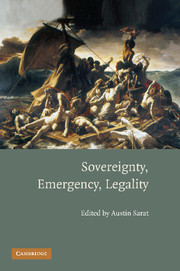Book contents
- Frontmatter
- Contents
- Contributors
- Acknowledgments
- Introduction: Toward New Conceptions of the Relationship of Law and Sovereignty under Conditions of Emergency
- 1 The “Organic Law” of Ex Parte Milligan
- Comment on Chapter 1: David Dyzenhaus, “The ‘Organic Law’ of Ex Parte Milligan”
- 2 Emergency, Legality, Sovereignty: Birmingham, 1963
- Comment on Chapter 2: “Order” in the Court
- 3 The Banality of Emergency: On the Time and Space of “Political Necessity”
- Comment on Chapter 3: Emergencies, Body Parts and Price Gouging
- 4 The Racial Sovereign
- Comment on Chapter 4: Toward a Nonracial Sovereign
- 5 Should Constitutional Democracies Redefine Emergencies and the Legal Regimes Suitable for Them?
- Comment on Chapter 5
- Index
Introduction: Toward New Conceptions of the Relationship of Law and Sovereignty under Conditions of Emergency
Published online by Cambridge University Press: 07 May 2010
- Frontmatter
- Contents
- Contributors
- Acknowledgments
- Introduction: Toward New Conceptions of the Relationship of Law and Sovereignty under Conditions of Emergency
- 1 The “Organic Law” of Ex Parte Milligan
- Comment on Chapter 1: David Dyzenhaus, “The ‘Organic Law’ of Ex Parte Milligan”
- 2 Emergency, Legality, Sovereignty: Birmingham, 1963
- Comment on Chapter 2: “Order” in the Court
- 3 The Banality of Emergency: On the Time and Space of “Political Necessity”
- Comment on Chapter 3: Emergencies, Body Parts and Price Gouging
- 4 The Racial Sovereign
- Comment on Chapter 4: Toward a Nonracial Sovereign
- 5 Should Constitutional Democracies Redefine Emergencies and the Legal Regimes Suitable for Them?
- Comment on Chapter 5
- Index
Summary
It is widely recognized today that times of national emergency put legality to its greatest test. In such times we rely on political leaders, using sovereign prerogative, to act in the national interest. John Locke famously defined that prerogative as the “power to act according to discretion, for the public good, without the prescription of the Law, and sometimes even against it. … [T]here is a latitude left to the Executive power, to do many things of choice, which the Laws do not prescribe.”
Yet, political leaders may go too far, threatening the values that define our national identity. Thus, in June 2004 the United States Supreme Court sharply rejected George W. Bush's assertions that he had unchecked unilateral authority to lock up indefinitely any person he declared an “enemy combatant” in the global “war on terrorism.” Writing for the Court, Justice Sandra Day O'Connor declared that a “state of war is not a blank check for the President.” And more recently, the Supreme Court ruled that foreign nationals held at Guantanamo Bay have a right to pursue habeas challenges to their detention. Justice Anthony M. Kennedy, writing for the majority in Boumediene v. Bush and Al Odah v. U.S., wrote that the Constitution's Suspension Clause “protects the rights of the detained by a means consistent with the essential design of the Constitution. It ensures that, except during periods of formal suspension, the Judiciary will have a time-tested device, the writ, to maintain the ‘delicate balance of governance’ that is itself the surest safeguard of liberty.”
- Type
- Chapter
- Information
- Sovereignty, Emergency, Legality , pp. 1 - 15Publisher: Cambridge University PressPrint publication year: 2010
- 4
- Cited by



